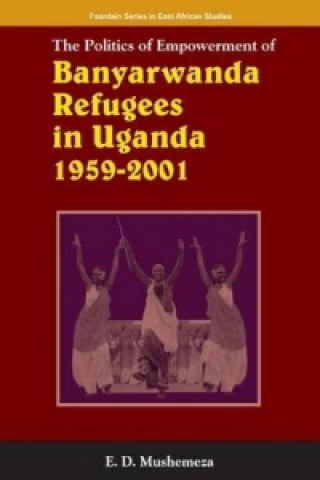
Kód: 09019479
Politics of Empowerment of Banyarwan
Autor Elijah Dickens Mushemeza
The Politics of Empowerment of Banyarwanda Refugees in Uganda 1959-2001 introduces empowerment discourse to the nexus between politics, security; and forced migration and refugees. Conceptualized as a group process where people, w ... celý popis
- Jazyk:
 Angličtina
Angličtina - Väzba: Brožovaná
- Počet strán: 180
Nakladateľ: Fountain Publishers, 2007
- Viac informácií o knihe

Mohlo by sa vám tiež páčiť
-

Berserk Deluxe Volume 1
48.34 € -5 % -

Haunting Adeline
30.72 € -

Berserk Deluxe Volume 3
51.72 € -

Berserk Deluxe Volume 2
52.95 € -

Atomic Habits
15.97 € -15 % -

LEGO Star Wars Visual Dictionary Updated Edition
26.31 € -4 % -

House of Leaves
23.45 € -22 % -

Berserk Deluxe Volume 5
52.33 € -

Chainsaw Man, Vol. 15
10.44 € -23 % -

Powerless
11.97 € -8 % -

Harry Potter and the Prisoner of Azkaban (Minalima Edition)
41.68 € -

Cry Baby Coloring Book
11.46 € -

Hunting Adeline
31.84 € -

Iron Flame
16.28 € -19 % -

The Official Stardew Valley Cookbook
26.01 € -9 % -

White Nights
3.57 € -24 % -

JUJUTSU KAISEN V22
12.49 € -7 % -

Gravity Falls Journal 3
20.68 € -5 % -

Berserk Deluxe Volume 4
48.23 € -5 % -

Heaven Official's Blessing: Tian Guan Ci Fu (Novel) Vol. 2
22.11 € -

Dune Messiah
9 € -21 %
Darčekový poukaz: Radosť zaručená
- Darujte poukaz v ľubovoľnej hodnote, a my sa postaráme o zvyšok.
- Poukaz sa vzťahuje na všetky produkty v našej ponuke.
- Elektronický poukaz si vytlačíte z e-mailu a môžete ho ihneď darovať.
- Platnosť poukazu je 12 mesiacov od dátumu vystavenia.
Viac informácií o knihe Politics of Empowerment of Banyarwan
Nákupom získate 154 bodov
 Anotácia knihy
Anotácia knihy
The Politics of Empowerment of Banyarwanda Refugees in Uganda 1959-2001 introduces empowerment discourse to the nexus between politics, security; and forced migration and refugees. Conceptualized as a group process where people, who lack their share of valued resources, strive to gain greater access to, and control over, those resources; empowerment of Banyarwanda refugees was possible through a protracted struggle. The book explores how the Banyarwanda refugees achieved reasonable levels of integration in Ugandan society because of similar demographics, social, economic, and cultural characteristics with the Ugandan population in the areas they settled. Had the Ugandan state not broken down in the late 1970s and 1980s, these refugees would have, perhaps acquired naturalization - a veritable form of empowerment. In contrast, although most Hutu and Tutsi refugees achieved meaningful levels of integration (as some were treated badly and abused with derogatory language), their leaders and some of the elites never gave up the dream of returning home. The book concludes that violent conflicts emerge because of a violation of human rights and denial of access to scarce resources, and Rwanda and Africa as a whole must build institutions that allow popular participation in decision making, transfer of political power from one group or generation to the other, and generally, to address the question of democracy and good governance.
 Parametre knihy
Parametre knihy
Zaradenie knihy Knihy po anglicky Society & social sciences Society & culture: general Social groups
62.16 €
- Celý názov: Politics of Empowerment of Banyarwan
- Autor: Elijah Dickens Mushemeza
- Jazyk:
 Angličtina
Angličtina - Väzba: Brožovaná
- Počet strán: 180
- EAN: 9789970027194
- ISBN: 9789970027194
- ID: 09019479
- Nakladateľ: Fountain Publishers
- Hmotnosť: 254 g
- Rozmery: 215 × 141 × 11 mm
- Dátum vydania: 29. December 2007
Osobný odber Bratislava a 2642 dalších
Copyright ©2008-24 najlacnejsie-knihy.sk Všetky práva vyhradenéSúkromieCookies



 21 miliónov titulov
21 miliónov titulov Vrátenie do mesiaca
Vrátenie do mesiaca 02/210 210 99 (8-15.30h)
02/210 210 99 (8-15.30h)